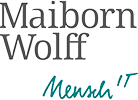"Parallels Desktop Business Edition is user friendly, integrated into macOS in a better way, and easier to configure than competing solutions."
MaibornWolff a German software development and IT consulting company that has been in business for over 30 years is proof of what expertise, entrepreneurial vision, and commitment to customers and employees can achieve.
The company began as a small software house working with Lotus Notes. MaibornWolff has grown to include hundreds of experts working at multiple locations.
These teams are involved in developing custom software for DAX 50 enterprises and medium-sized companies. Their work includes blockchain and development and operations activities, agile transformation, Salesforce, IT modernization, and Internet of Things (IoT) projects.
After six successive years of 25% growth in staff size and business volume, MaibornWolff has become a household name in Germany's IT service market. They've earned top rankings as an ITC employer and are considered one of the best places to work in their market.
The Challenge — Mac users needed to access key Office apps
Many MaibornWolff employees prefer Macs, but Microsoft Office applications are necessary for key business activities. Instead of restricting team members to PCs, MaibornWolff's IT leaders sought a solution that enabled teams to use their Macs with Microsoft Office already deployed across the organization.
Jakob Tewes heads up the technical infrastructure department at MaibornWolff. In his own words, he is responsible for "everything that has a plug" at the company.
When Jakob joined MaibornWolff in 2011, he encountered many unhappy users.
The primary reason for their discontent? His predecessor decided to discontinue support for MacBook computers, based on the belief that the IT department could not effectively administer a fleet of MacBooks that were largely used to run Microsoft Office applications.
The affected Apple aficionados could keep their MacBook computers, but the IT department would only supply Windows notebooks in the future. Naturally, MaibornWolff employees were not happy about this shift.
The Test — finding a seamless virtualization solution
In addition to the users' strong emotional bond with their Apple products, there were several other reasons for reactivating the MacBook computers. After all, Macs are robust and well-built, offer a remarkably long battery life, and are easy to migrate when it is time for tech refresh.
However, Jakob was somewhat less thrilled by the prospect of deploying Microsoft Office for Mac on Apple systems and then simply reapproving them. The macOS version's limitations were overly restrictive for everyday users, and he wasn't keen on imposing them on users without seeking a better solution.
His ideal scenario was deploying MacBook computers featuring the Windows version of MS Office as the sole supported application software, avoiding any additional burden on support teams.
One option was to go with Boot Camp, the built-in macOS software, and configure the computers as dual-boot systems. Jakob also considered using one of the available virtualizing solutions that enable operating system swaps without restarting the system.
The Boot Camp option was quickly removed from consideration — this solution is known to be high-maintenance, and the reboot needed for each OS swap is not very practical. This elimination left various professional virtualization solutions for Mac as the primary option.
After researching the options, Jakob settled on Parallels Desktop for Mac Business Edition. According to him, there were several reasons for choosing Parallels Desktop for Mac.
The Solution — Parallels Desktop Business Edition and Coherence Mode
"Compared to competing products, Parallels Desktop Business Edition was user-friendly, integrated into macOS in a better way, and easier to configure. Furthermore, its Coherence mode—showing Windows and macOS windows concurrently on the same desktop—appealed to us."
The team's MacBook computers were equipped with Parallels Desktop for Mac Business Edition and Microsoft Office licenses and recommissioned for productive use.
With Parallels Desktop Business Edition in place, MaibornWolff employees can now use Microsoft Office on their MacBooks. Coherence Mode allows them to run Windows applications side-by-side with Mac applications, so they can access the Microsoft Office software they need as if it were native to macOS. And there's no need to reboot!
Naturally, Jakob's decision earned him a good first impression with Mac fans at MaibornWolff, but that wasn't his first concern.
"Of course, it was quite pleasant to be able to remove the resentment generated by the prior unpopular decision. However, it is more important in the long run that Parallels Desktop meets all the expectations regarding stability, speed, day-to-day usability, and easy maintainability."
Jakob insists that employees at MaibornWolff have as much freedom of choice as possible regarding the usage and software configuration of their devices. That is part of the company's corporate culture as he sees it.
"We, the people in charge of IT, want to provide our users with systems that are easy to operate, run reliably, and need little support, and that don't turn out to be productivity bottlenecks. Fitting MacBook computers with Parallels Desktop Business Edition gives us just that kind of productivity platform."
The Result — high performance and happy Mac users
Today, around 60% of MaibornWolff's workforce uses MacBook computers, and the Parallels Desktop Windows virtual machine running on them supports Office 365.
They show no differences in performance compared to the company's Windows laptop computers. "I scarcely need to mention that our dedicated Apple users seem clearly more relaxed as they spend their day in the office," Jakob adds with a smile.
See more Customer Stories






